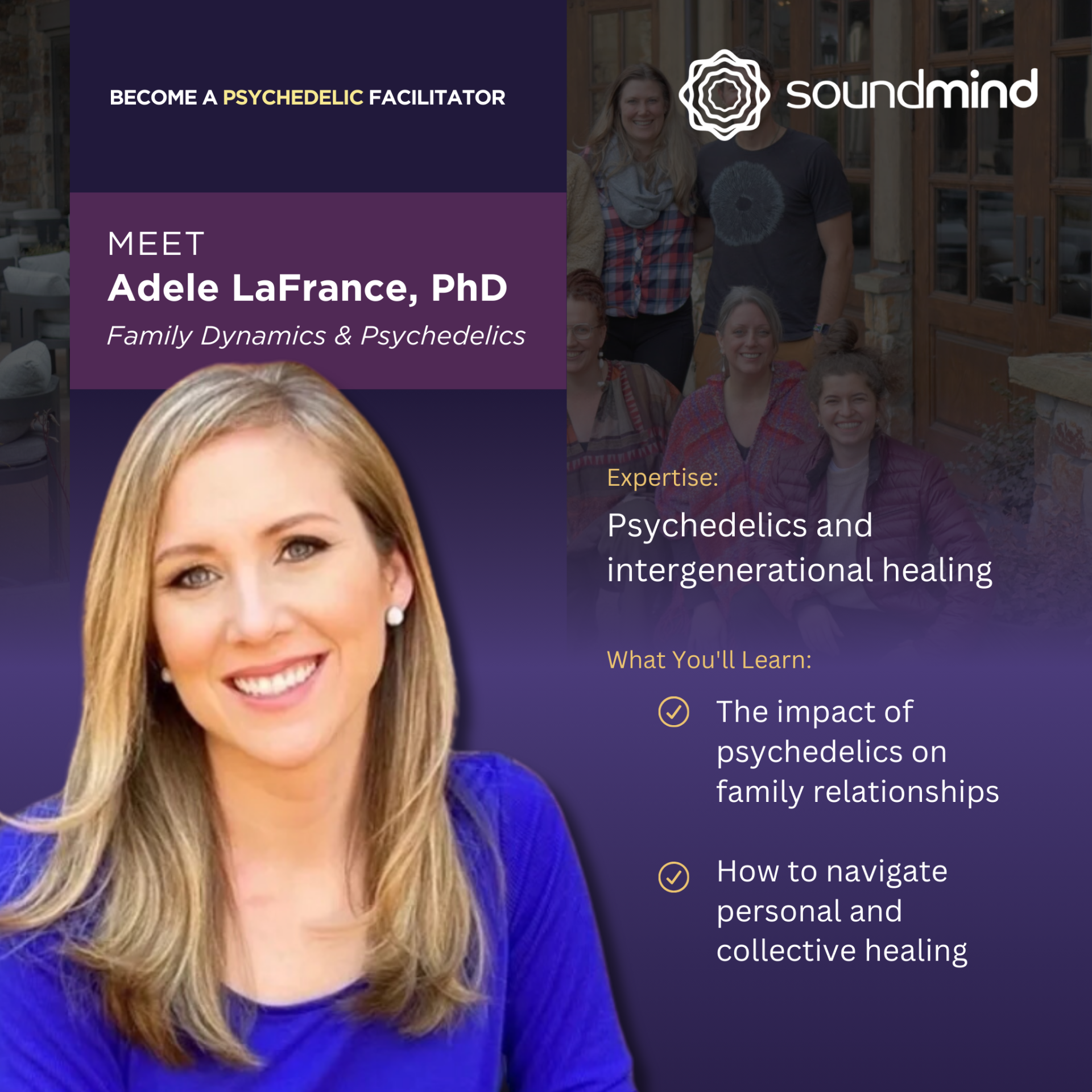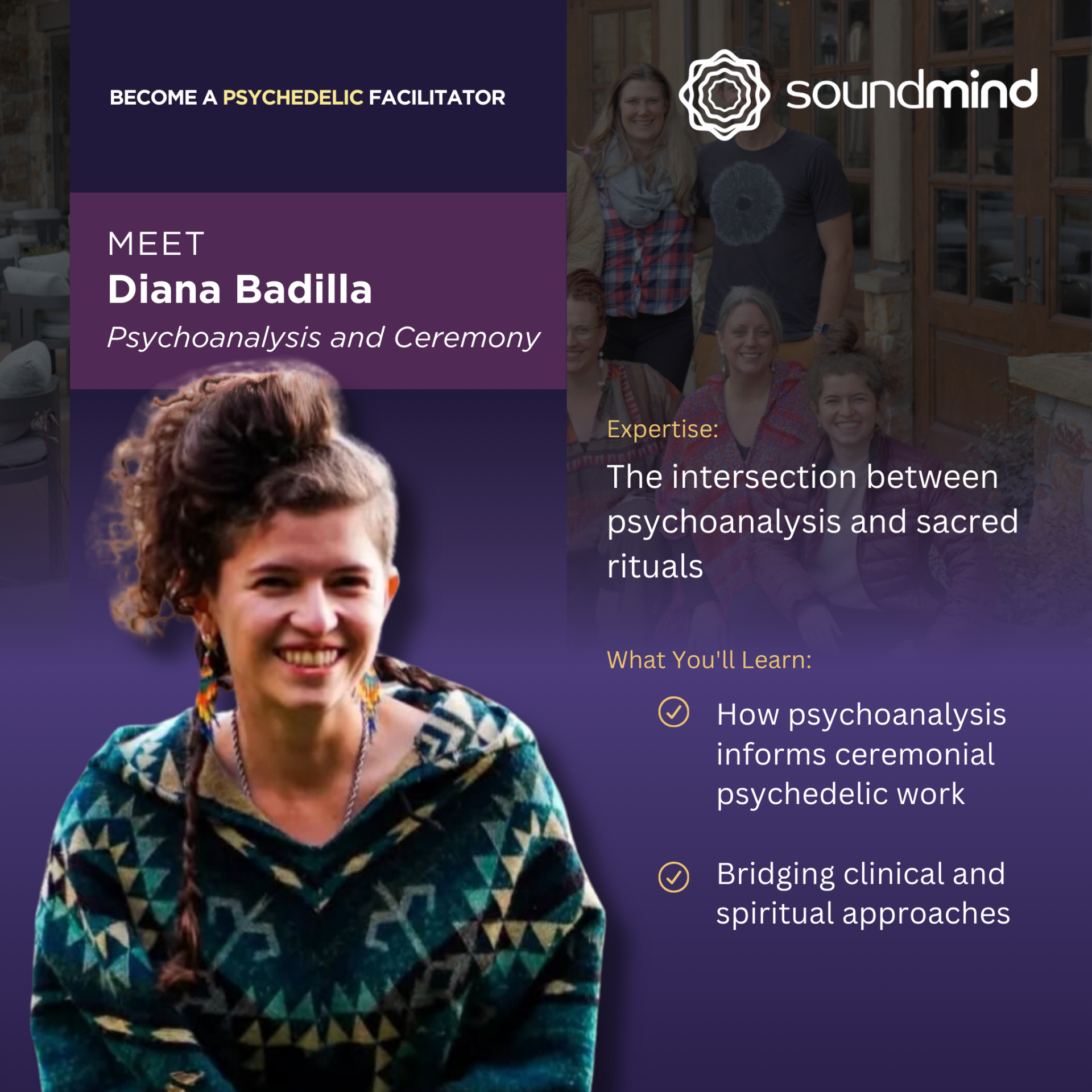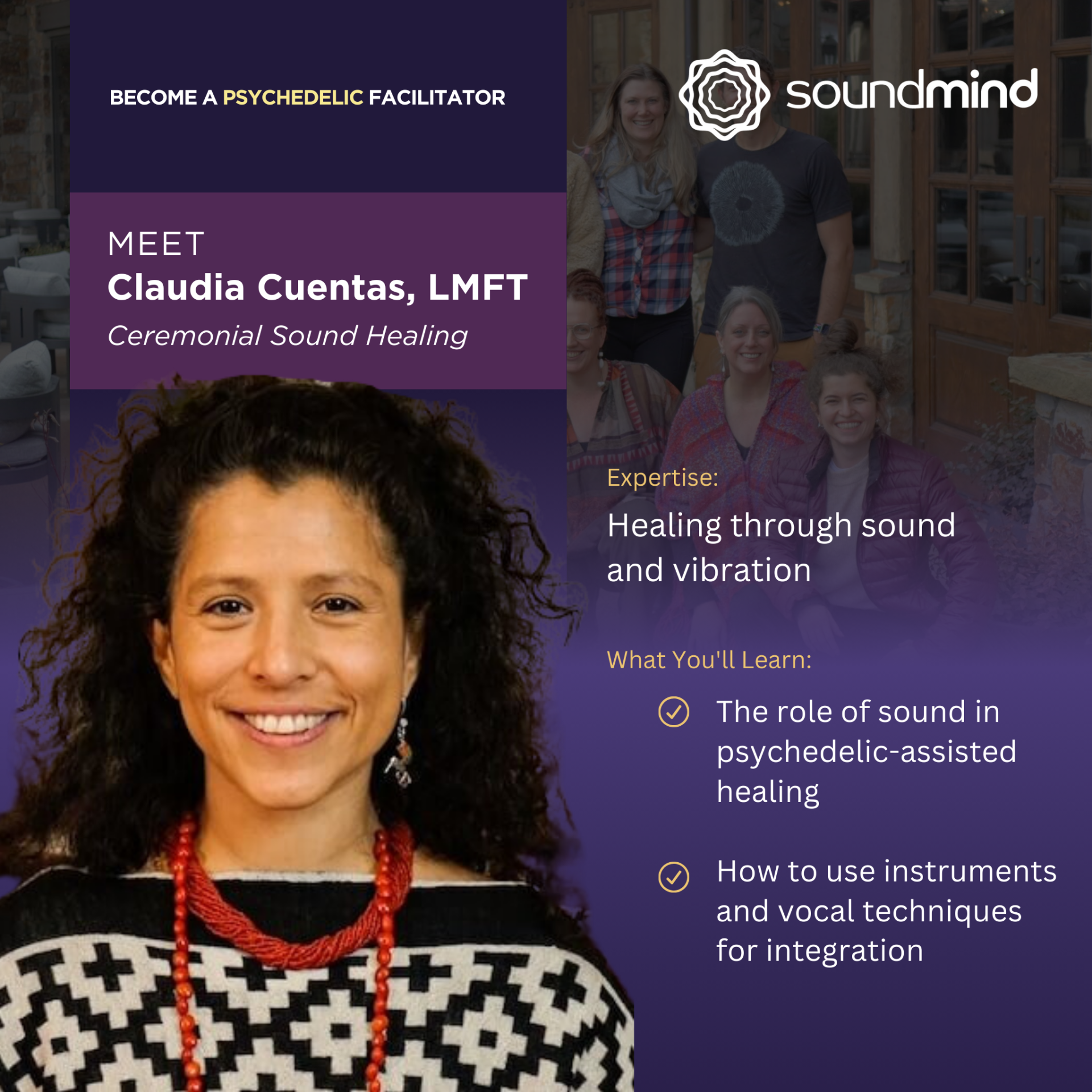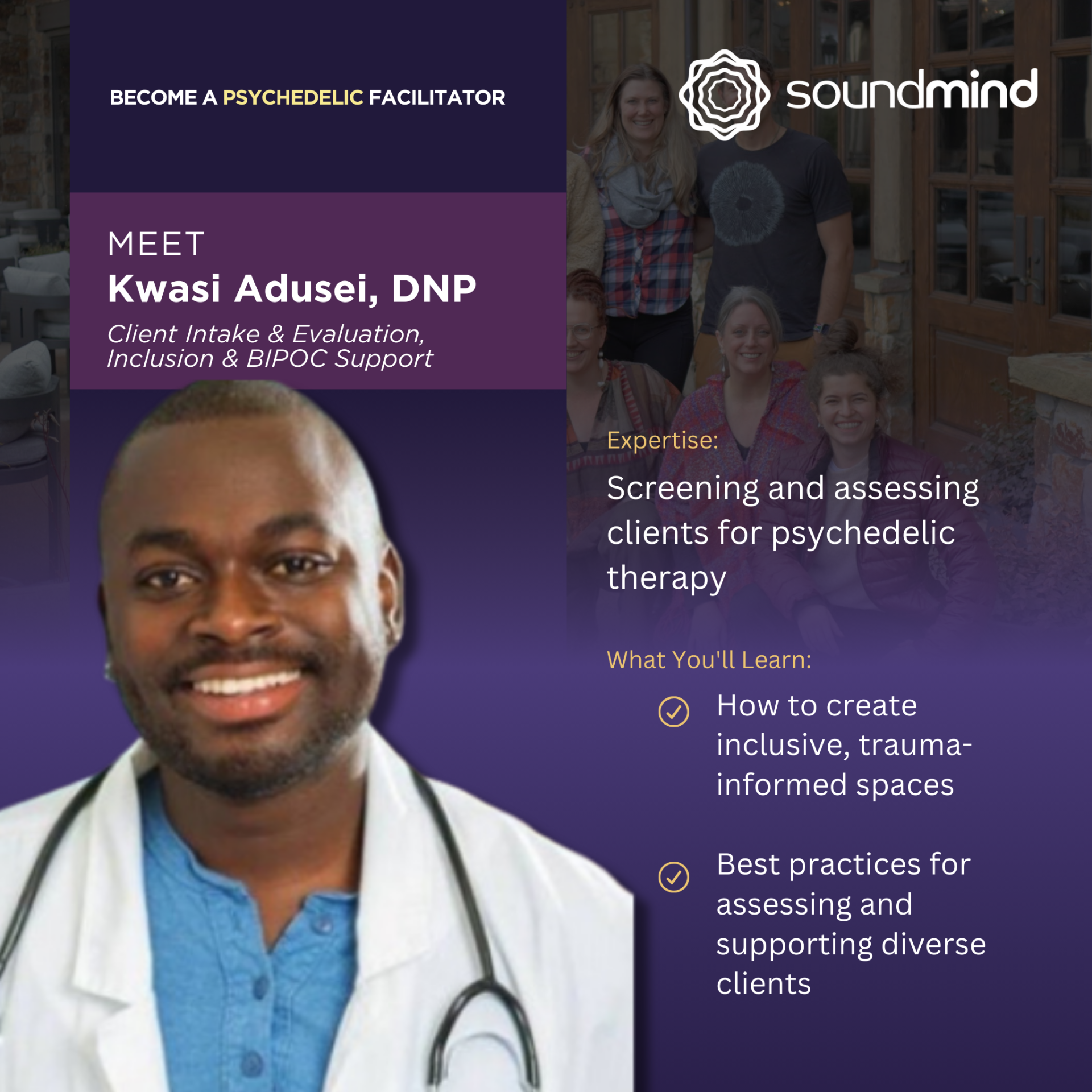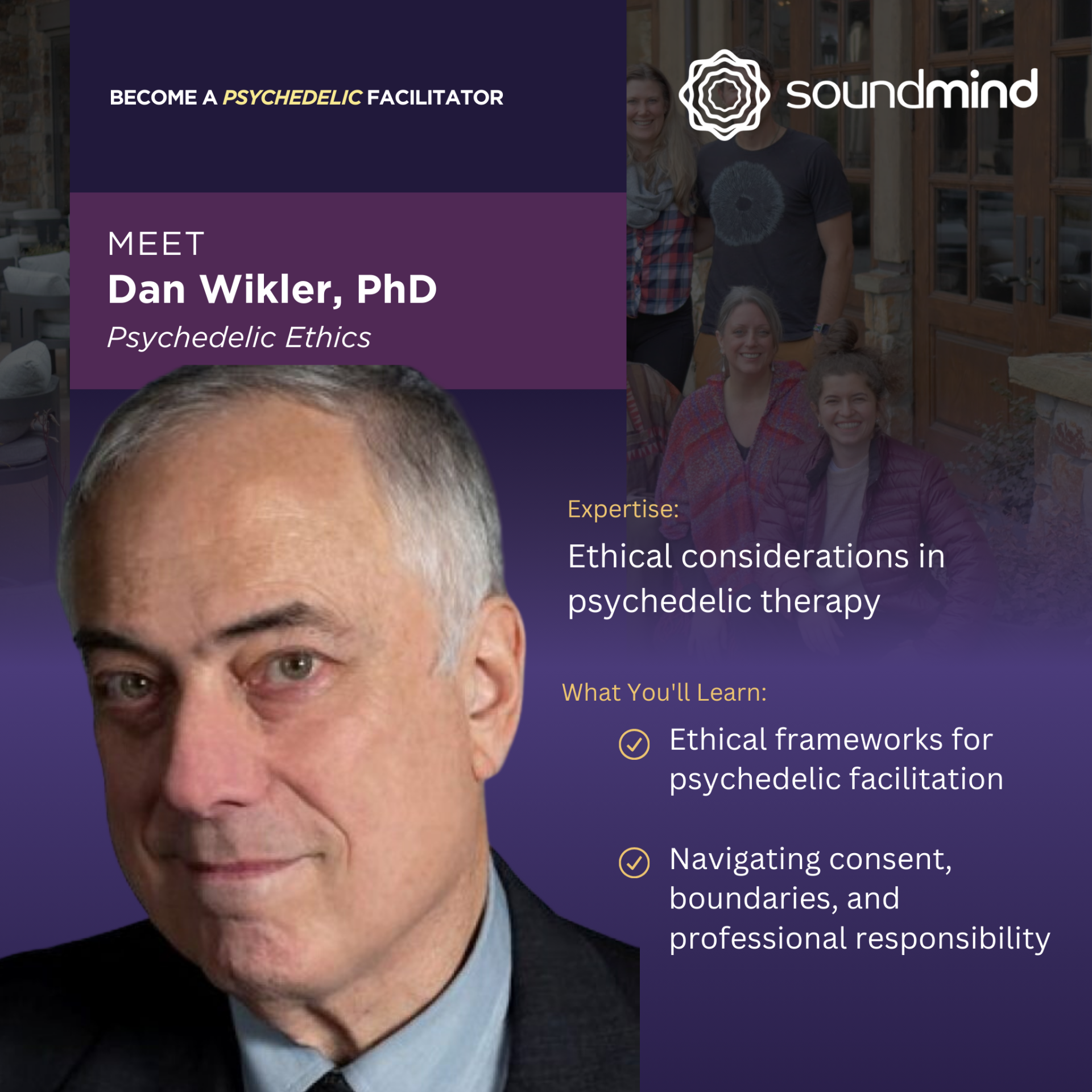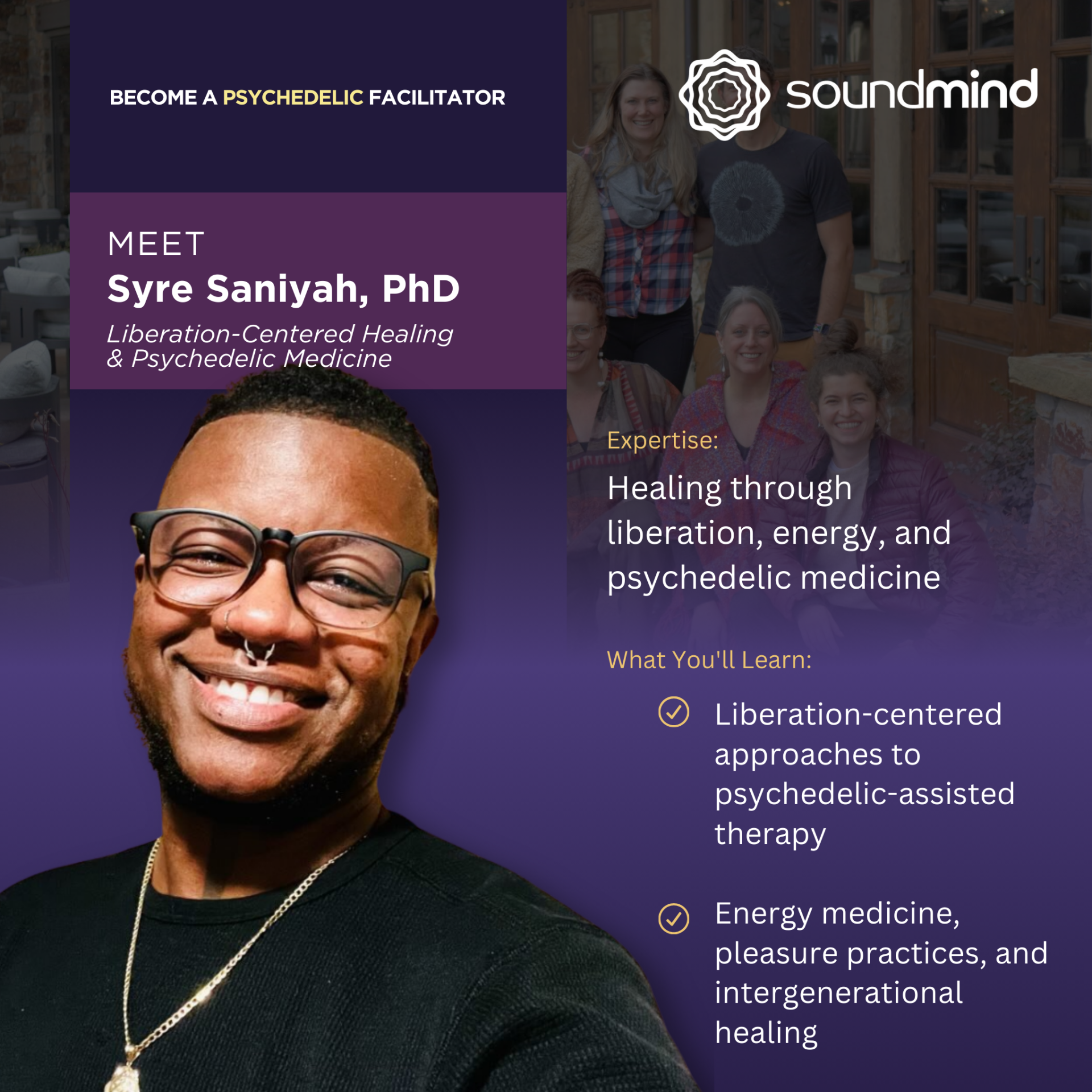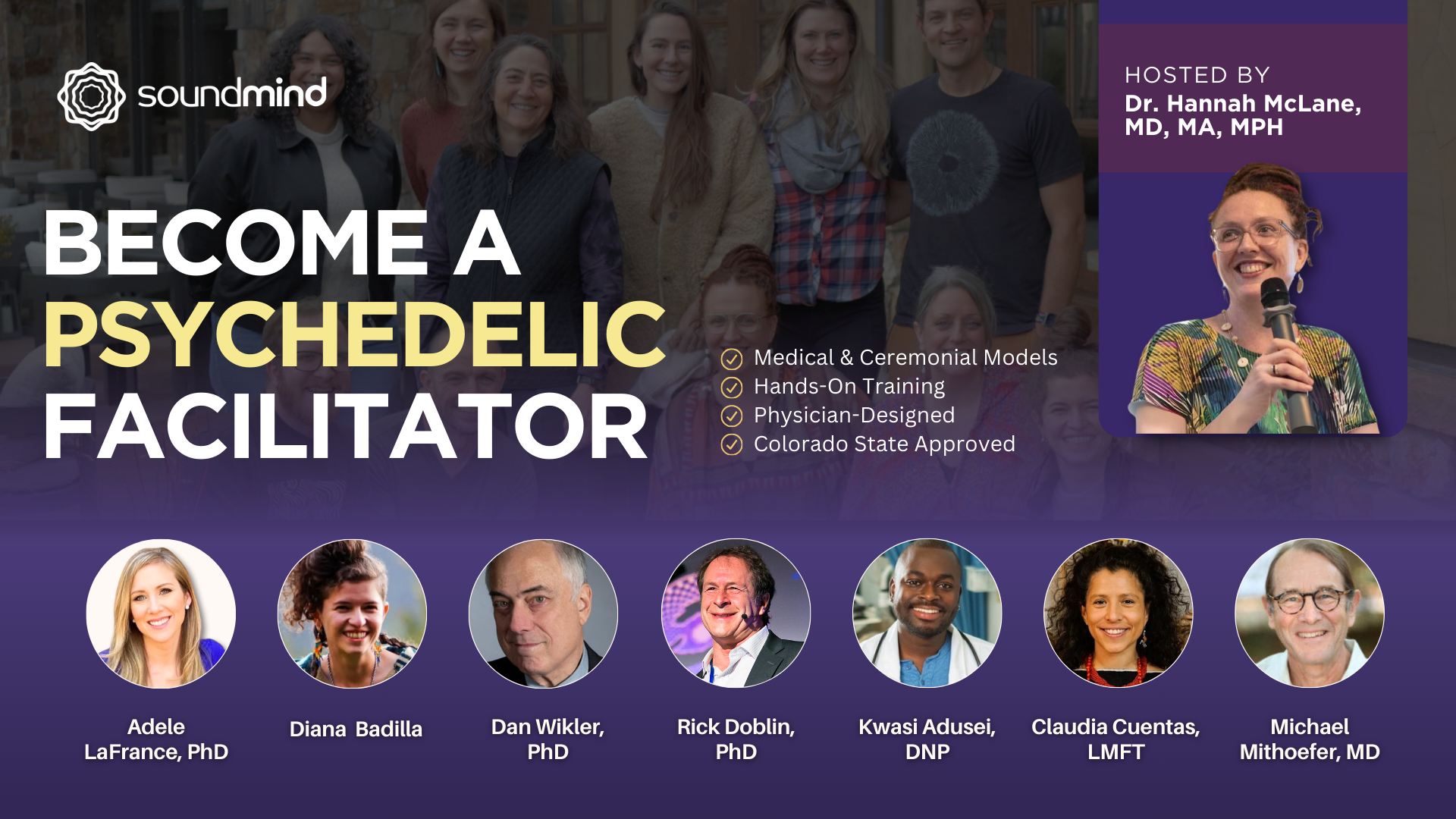
Looking for Psychedelic Therapist Training Programs?
Join SoundMind's 2026 Psychedelic Therapy Training
Take Our Psychedelic Assisted Therapy Training and
Become a Certified Psychedelic Facilitator
Equipping you to guide transformational experiences with authenticity, purpose, and care. Unlike other programs that focus solely on clinical frameworks, we integrate the cultural, spiritual, and therapeutic aspects of psychedelic facilitation. Led by active practitioners deeply engaged in the community, our program isn’t just about learning techniques—it’s about becoming a facilitator who walks the talk, honors traditions, and creates spaces for profound healing.
Now Enrolling! Apply Today!
Our psychedelic facilitation certificate program is held by industry leaders featured in...


Hear from our Graduates
Graduates say SoundMind's program is
transformational | more than a program | life-changing | full of clinical & personal growth
The breadth of knowledge that it hits on more than just psilocybin... it’s really hitting all of the facets around this. So psilocybin, along with other modalities, and then all of the different kind of things surrounding that... how mental health, traditional mental health, ties into that.
ryan reid
The perfect blend of clinical and personal growth. It really helped bring our standard of care to another level.
Alicia Hugh
The container that was held by the team with the reverence and level of just sacredness was something that I'll never forget. SoundMind is really unique in its efforts to provide this big-picture view of ways to be a psychedelic facilitator.
Cené bryant
Join One of the Most Comprehensive & Respected Psychedelic Facilitator Training Programs
Our psychedelic assisted therapy certification program redefines how facilitators approach psychedelic therapy education. SoundMind’s training combines innovative techniques with immersive learning experiences to help you master the art of guiding meaningful healing journeys. With an emphasis on ethical practice, cultural awareness, and hands-on application, this program prepares you to create safe and transformative spaces for those seeking profound change. Whether you’re new to the field or expanding your expertise, our training provides the depth and flexibility to meet your needs.
Write your awesome label here.
Testimonial
Write your awesome label here.
What's included?
Our program is designed to provide a comprehensive, hands-on learning experience that prepares you for every aspect of psychedelic facilitation. With a blend of live training, self-paced content, and expert mentorship, you’ll gain the knowledge, skills, and confidence to excel in this transformative field. Here’s what’s included:
Live Interactive Training Sessions
Engage with experienced facilitators through live classes designed to deepen your understanding of psychedelic facilitation.
Self-Paced Learning Modules
Access comprehensive, on-demand content covering psychodynamic techniques, integration practices, and clinical protocols.
Hands-On Practicum Opportunities
Gain real-world experience in facilitation through optional in-person practicum sessions for immersive, skill-based learning.
Cutting-Edge Curriculum
Dive into evidence-based approaches blending science, tradition, and ethics to build a well-rounded foundation for facilitation.
Community Support
Join a vibrant network of peers and mentors dedicated to collaboration, sharing insights, and advancing the field of psychedelic therapy.
Expert Guidance from Leading Practitioners
Learn directly from practitioners who bring years of clinical and ceremonial expertise to every session.
Certificate of Completion
Upon finishing the program, earn a certificate that demonstrates your training with an accredited, state-approved organization.
Online Access to Course Materials
Review course content anytime during program to support your continued growth and application in the field.
Tuition Cost
Early Bird Offer: Secure Your Spot Today and Save on Your Path to Purposeful Facilitation
How does SoundMind compare to other programs?
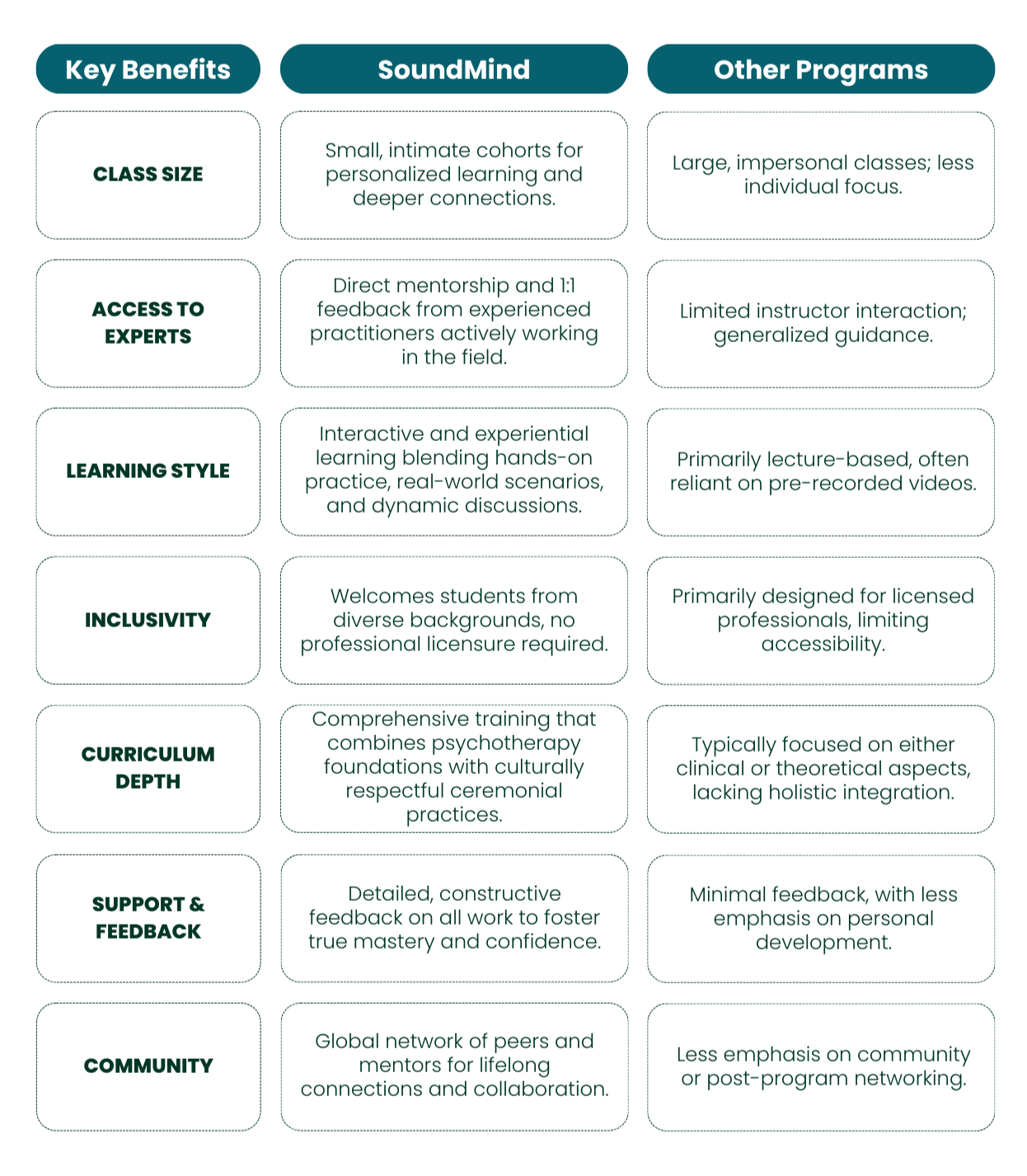
Curriculum Overview
Topics we cover in this comprehensive certificate program
Core Foundations of Psychedelic Facilitation
- Build a strong foundation in ethical, effective psychedelic therapy.
- Explore the Science: Learn the latest research on ketamine, psilocybin, and MDMA.
- Master Techniques: Develop psychodynamic skills tailored for psychedelic therapy.
- Understand Ethics: Navigate cultural, legal, and ethical considerations.
Ketamine-Assisted Psychotherapy Training
- Therapeutic Applications: Master ketamine’s use in addressing depression, PTSD, and anxiety.
- Session Preparation and Integration: Learn how to guide clients through ketamine-assisted therapy, from preparation to integration.
- Hands-On Experience: Participate in supervised ketamine sessions to build practical, real-world skills.
Psilocybin Facilitator Training
- Facilitate Healing: Guide clients safely through psilocybin therapy.
- Practical Training: Refine skills during immersive retreats in Colorado.
- Meet State Standards: Fulfill all requirements for certification to practice in Colorado.
Contemplative and Mindfulness Training
- Learn the fundamentals of meeting your own thoughts and emotions
- Develop and deepen a personal meditation practice
- Receive training in leading others through guided meditation
Integration Practices
- Learn techniques to help clients integrate their experiences into daily life, fostering meaningful, long-term healing.
- Develop tools to support reflection, self-awareness, and actionable steps that enhance personal growth.
Ethical and Inclusive Practice
- Clinical Ethics and Boundaries: Learn how to navigate consent, patient care, and professional boundaries with integrity and mindfulness.
- Cultural Sensitivity and Inclusion: Foster equity and accessibility in your practice, ensuring healing spaces are inclusive for BIPOC and marginalized communities.
Ceremonial Practices
- Explore the rich ceremonial and historical traditions that inform psychedelic healing.
- Learn the origins of these practices and how they have shaped modern facilitation approaches.
- Apply culturally respectful and ethical practices to your facilitation work.
- Understand the importance of honoring these traditions while adapting them responsibly in modern contexts.
Somatic Approaches to Healing
- Learn how to incorporate somatic techniques to help clients process emotions and trauma through the body.
- Understand the connection between physical sensations and emotional healing.
- Explore methods like breathwork, grounding exercises, and mindful movement.
Trauma-Informed Facilitation
- Develop skills to recognize and address trauma responses during psychedelic sessions.
- Learn how to create a safe and supportive environment for clients.
- Gain tools for managing difficult experiences with sensitivity and care.
"The course curriculum and digital membership site are thoughtfully organized, packed with extensive resources and a fantastic lineup of guest teachers and facilitators. Without any doubt, I would highly recommend the SoundMind certification course to Western- or Eastern-trained practitioners, healers, and mental health advocates who want to work with these sacred and extraordinary medicines."
-Deborahlise Mota, LAc, PhD(c)
Why Choose SoundMind's Psychedelic Training Program?
Online Program with Optional In-Person Practicum
Accessible, Insightful Training for Everyone
Our program is designed to make complex concepts simple and engaging, perfect for therapists and non-therapists alike. We break down the science without overloading you with medical jargon, ensuring anyone can grasp the knowledge and apply it meaningfully.
Learn From Experts
Our instructors are experts who actively work with psychedelics in therapy, research, and ceremonial settings. With decades of hands-on experience, they truly understand this work and know how to make it approachable and meaningful for you.
State-Approved
Our programs are state-approved, meeting the rigorous standards required for licensure in Colorado. This ensures that our training is not only credible but also aligned with the highest professional standards. Even if you’re an international student, this accreditation underscores the quality and reliability of the education you’ll receive with us.
Immersive Learning Experience
There’s no substitute for real-world experience. With our supervised retreats, you’ll have the chance to work directly with these medicines in a safe, supportive environment. These hands-on practicums will help you build the confidence and skills you need to guide transformative journeys.
Strategic and Comprehensive Curriculum
Our program goes well beyond basic science to offer you the most comprehensive facilitation education possible. You’ll learn psychodynamic techniques, ethical practices, and culturally respectful approaches to create healing spaces that are truly inclusive and impactful. It’s a holistic approach that prepares you for every aspect of this transformative work.
Community Support & Accountability
When you train with SoundMind, you’re not just enrolling in a program—you’re joining a community. From mentors to alumni to industry leaders, you’ll have a support network that’s with you long after you graduate. We’re here to help you grow and succeed in this exciting, meaningful field.
Meet your lead instructor
Hannah C. McLane, MD, MA, MPH
Dr. Hannah McLane, MD, MA, MPH, is a trailblazer in the psychedelic field, an accomplished entrepreneur, and the visionary founder of SoundMind Institute. SoundMind is recognized for its rigorous training programs and cutting-edge research, setting new standards in ethical psychedelic facilitation and fostering equity and innovation within the ecosystem. Dr. McLane and her groundbreaking work have been spotlighted by prominent outlets such as National Geographic, Al Jazeera, PBS, NBC, the Today Show, The New York Times, and others.
Dr. McLane’s educational journey includes studies at McGill University and advanced degrees from Temple University (MA in Communication Sciences and Spanish Language), Brown University (MD with a focus in Contemplative Studies), and Harvard School of Public Health (MPH in Global Health and Bioethics). She completed medical residencies in Neurology and Occupational and Environmental Medicine at the University of Pennsylvania and a fellowship in Patient Safety at the Philadelphia VA Hospital. Additionally, she trained extensively in relational psychoanalysis through a five-year program, reflecting her dedication to understanding the human psyche.
Her research and professional interests are diverse, spanning psychedelics’ applications in neurodiversity and ADHD, ethical considerations surrounding psychedelics and touch, Buddhist meditation’s intersection with psychedelic therapy, and the exploration of power dynamics in psychedelic communities, including cult behavior and narcissism. Dr. McLane has shared her insights at conferences worldwide and has actively contributed to these fields since 2019.
Raised in rural New Hampshire, Dr. McLane’s worldview has been shaped by her years spent living in South America and East Asia. As a neurodiverse individual (dyslexia and ADHD), a queer woman, and a proud mother to a six-year-old son, she brings a deeply personal and inclusive perspective to her work in advancing the transformative potential of psychedelics.
Patrick Jones - Course author
Who is this certification program for?
Live Zoom Classes with Guest Experts
Live classes are recorded for your access during and after the program.
Write your awesome label here.
Student testimonials
Meet Some of Our Former Graduates!
Write your awesome label here.
Frequently Asked Questions
How long is the class and how much is pre-recorded content?
The program begins with our Psychodynamic Prerequisite, an 8-week asynchronous curriculum featuring prerecorded lectures, reading materials, and homework assignments.
Our Core Curriculum starts on September 16. It runs for 9 months with live Zoom sessions held once a week for 2 hours. These sessions include guest lecturers and allow you to ask questions in real time. This interactive format is a unique and special part of our program within the psychedelic education field.
Additionally, each student participates in weekly, hour-long small group meetings. These provide an opportunity to connect with classmates, ask questions, and practice skills in a supportive setting.
Are there small group meetings too?
Yes, we have required weekly accountability groups. These are hour-long sessions with fellow classmates, supervised by teaching assistants. In these groups, students discuss course material, practice skills, and have an open forum to ask questions.
What is the time commitment per week outside of class (readings, homework, etc.)?
Readings and other activities typically require 8 to 10 hours of work outside of class each week. Weekly homework questions are assigned to assess comprehension of the material. If students fall behind on readings, they may request an extension and can be granted up to two months after the course ends to complete and submit all assignments.
To earn the class certificate, students must complete all readings and homework assignments, pass a final comprehensive written exam, and attend an approved hands-on experiential practicum.
All classes are recorded, and students have access to these videos both during the course and for one year after completion.
What if I miss one or two classes?
No problem! Classes are recorded so you can catch up on anything you miss each week.
If you need to miss more than five lectures during the 8-month Core Curriculum, you may be required to arrange make-up sessions to meet curriculum requirements. Students are allowed up to five absences throughout the course and must notify instructors via email in advance of any missed classes.
I’m not a clinician but I’m interested in the program. Can I still apply?
Yes! Our application is open to everyone interested in psychedelic-assisted psychotherapy facilitation. The prerequisite curriculum, “Psychodynamic Techniques for Psychedelic Facilitators,” provides all students with a strong foundation in psychoanalytic and psychodynamic therapy skills.
We believe an equitable and thriving psychedelic ecosystem includes both licensed and unlicensed trainees. Rather than requiring medical or mental health licensure, we focus on students’ capacity for ethical practice, self-reflection, and commitment to growth throughout the training.
We prioritize applicants with experience in non-ordinary states of consciousness and those who maintain daily meditation practices. Additionally, we value curiosity about scientific literature and welcome trainees who bring complementary skills to their facilitation work, such as bodywork, somatic training, herbalism, or other relevant expertise.
Can you tell me how you select your instructors?
We have an extensive roster of teachers who have been part of our program since its inception in 2019. Our faculty hold expertise across a wide range of fields, including psychedelic medicine, psychology, pharmacology, bioethics, and traditional medicine practices.
We make a special effort to include providers with diverse therapeutic approaches, such as somatic therapy, meditation, breathwork, hypnotherapy, internal family systems, and psychoanalytic methods. Additionally, we have teachers who specialize in ceremonial approaches to psychedelic and plant medicine work, representing various cultural backgrounds.
All our teachers are grounded in an anti-racist, anti-oppression framework to ensure an inclusive and respectful learning environment.
Can I legally provide psychedelic therapy after this program? What does the certificate allow me to do?
In Colorado, psilocybin has been legalized for therapeutic use. Our SoundMind certification uniquely positions graduates to pursue licensure to practice psychedelic facilitation legally within Colorado’s regulatory framework, offering a distinct advantage for those seeking to work in this emerging field.
Currently, the only psychedelic legally approved for therapeutic use across the United States is ketamine, which must be administered by a facilitator affiliated with a physician who can prescribe it. MDMA-assisted psychotherapy, primarily for PTSD, is available only through research studies, requiring additional specialized training.
Our program covers how psychedelics—including ketamine, psilocybin, and MDMA—are integrated with psychotherapy. Additionally, we emphasize the importance of ceremony, ritual, and traditional medicine practices in shaping contemporary psychedelic medicine. Through hands-on learning, students explore ways to incorporate these approaches into psychedelic-assisted therapy modalities.
Outside of Colorado’s evolving psilocybin legislation, there is currently no national standardization or credentialing board for psychedelic-assisted therapy. Therefore, no single course or program can confer formal accreditation to practice with psychedelics. Instead, this course provides a solid foundation for building a career in psychedelics, supported by a community of like-minded practitioners to help graduates thrive as aboveground psychedelic therapies continue to expand.
How much is tuition?
The cost of the program is $12,300. With our Summer Special Discount, available until August 15, 2025, the price is reduced to $11,300. You can choose to pay the full amount upfront or opt for a payment plan.
The optional in-person experiential component ranges from $2,500 to $6,000, depending on the location and type of medicine selected.
Can I get a refund if I deposit and my finances change?
Yes. For the Psychodynamic Prerequisite, refunds are available up until the release of the third week of content. For the Main Curriculum, you can request a refund up to four weeks after the first lecture.
We understand that life circumstances and priorities can change, and we want to ensure all students have the time and space needed to fully engage in the program.
What makes SoundMind unique?
At SoundMind, equity, social justice, and ethics are at the heart of all we do. We have designed an inclusive psychedelic training focused on serving marginalized communities and advancing accessible healing.
Unlike other programs, we prioritize community over profit, offering smaller classes, live expert instruction, and personalized mentorship. Our state-approved curriculum meets Colorado licensure standards and covers psychodynamic techniques, ethical practice, and culturally respectful approaches.
Whether you’re a therapist or new to the field, our program makes complex concepts clear and engaging. When you join SoundMind, you gain a lifelong community of mentors, alumni, and industry leaders dedicated to your growth.
Welcome to the psychedelic revolution that starts with inclusion and true healing!
Some of our lecturers include:
Claudia Cuentas, LMFT
Claudia Cuentas is a Peruvian immigrant, a bilingual and bicultural artist, a license marriage and family therapist, a researcher, and an educator, specializing in the intersectionality of art, healing trauma, trauma recovery, cultural identity, indigenous knowledge and decolonization of healing. She has an Master’s in Counseling Psychology and is trained in Drama Therapy, Expressive Arts Therapy, Somatic Experiencing, and Trauma-Informed Care. She also has extensive studies in Indigenous healing, from her native Aymara and Quechua lineages of South America.
Claudia started her journey as an educator and advocate of art, as a tool for healing and liberation. In becoming a therapist, after her studies at the California Institute of Integral Studies, Claudia focused on serving immigrant communities, families, and children. She has worked with undocumented families, refugees, homeless population, and women survivors of violence, especially dealing with PTSD. Upon arriving to Portland, Oregon, Claudia joined the team at Conexiones, a Multicultural Center for Trauma Recovery. Claudia has completed parts A and B of the Multidisciplinary Association for Psychedelic Studies (MAPS) MDMA Therapy Training Program. She continues to participate in ongoing training and education on the intersectionality of generational trauma, plant medicine science, eco-informed therapy, nervous system healing, and indigenous wisdom
Dr. Kwasi Adusei
Dr. Kwasi Adusei is a service-oriented, curious Ghanaian native passionate about the intersections of community, wellbeing, and technology. He is a psychiatric mental health nurse practitioner, co-founder of the Psychedelic Society of Western New York, and led the development of a grassroots psychedelic harm reduction organization called the Sanctuary Project. As an educator and community organizer, he is informed by his experience with the war on drugs and community mental health, both as a patient and a clinician. He serves on the boards of Reconsider, the Source Research Foundation, the Psychedelic Medicine Association, and the Psychedelic Research And Training Institute, and is part of the Diversity Working Group for MAPS and an adjunct at the California Institute of Integral Studies.
Rick Doblin, PhD
Rick is the founder and executive director of the Multidisciplinary Association for Psychedelic Studies (MAPS). He received his doctorate in Public Policy from Harvard's Kennedy School of Government, where he wrote his dissertation on the regulation of the medical uses of psychedelics and marijuana and his Master's thesis on a survey of oncologists about smoked marijuana vs. the oral THC pill in nausea control for cancer patients. His undergraduate thesis at New College of Florida was a 25-year follow-up to the classic Good Friday Experiment, which evaluated the potential of psychedelic drugs to catalyze religious experiences. He also conducted a thirty-four year follow-up study to Timothy Leary's Concord Prison Experiment. Rick studied with Dr. Stanislav Grof and was among the first to be certified as a Holotropic Breathwork practitioner. His professional goal is to help develop legal contexts for the beneficial uses of psychedelics and marijuana, primarily as prescription medicines but also for personal growth for otherwise healthy people, and eventually to become a legally licensed psychedelic therapist. He founded MAPS in 1986, and currently resides in Boston with his wife, dog, and empty rooms from three children, one of whom is in college and two have graduated.
Michael Mithoefer, MD
Michael Mithoefer is a psychiatrist living in Asheville, NC, with a research office in Charleston, SC. In 2000, he began collaborating with MAPS on the first U.S. Phase 2 clinical trial of MDMA-assisted psychotherapy. He and his wife Annie have since conducted two of the six MAPS-sponsored Phase 2 clinical trials testing MDMA-assisted psychotherapy for PTSD, as well a study providing MDMA-assisted sessions for therapists who have completed the MAPS-sponsored MDMA Therapy Training Program, and a pilot study treating couples with MDMA-assisted psychotherapy combined with Cognitive-Behavioral Conjoint Therapy. He is now Senior Medical Director for Medical Affairs, Training and Supervision at MAPS Public Benefit Corporation (MAPS PBC). He is a Grof-certified Holotropic Breathwork Facilitator, is trained in EMDR and Internal Family Systems Therapy, and has nearly 30 years of experience treating trauma patients. Before going into psychiatry in 1991, he practiced emergency medicine for ten years, served as medical director of the Charleston County and Georgetown County Emergency Departments, and has held clinical faculty positions at the Medical University of South Carolina. He has been board-certified in Psychiatry, Emergency Medicine, and Internal Medicine.
Harvey Schwartz, PhD
Harvey is a licensed psychologist who specializes in treating complex PTSD, dissociative disorders, as well as patients with spiritual and therapy-related trauma. He has undergone advanced Ketamine-Assisted Therapy training through the Ketamine Training Center and the MAPS MDMA-Assisted Therapy Training Program and is currently a Sub-Investigator and Co-therapist, a supervisor, and a trainer on the MAPS MDMA-Assisted Therapy Clinical Trials. In his clinical work and consultation, he synthesizes relational psychodynamic, archetypal, existential, and mindfulness perspectives. He has worked on advancing the theory and practice of integration in psychedelic therapies. Harvey is the training director and a lead trainer in the Polaris Insight Training Program.
Chris Stauffer, MD
Dr. Stauffer is Assistant Professor of Psychiatry at the Oregon Health & Science University (OHSU), Physician-Scientist with the VA Portland Health Care System, and dual board-certified in Psychiatry and Addiction Medicine. Dr. Stauffer is an OHSU medical school alum, completed Adult Psychiatry Residency at the University of California, San Francisco (UCSF), and was an Advanced Neuroscience Research Fellow at the San Francisco VA prior to receiving a Veterans Affairs Clinical Science Career Development Award.
Dr. Stauffer serves as Supervisor for MAPS’ MDMA Therapy Training Program, mentor for the Center for Psychedelic Therapies and Research certificate program at the California Institute of Integral Studies, core faculty for the Integrative Psychiatry Institute’s Psychedelic-Assisted Therapy Training, course contributor for Psychedelic.Support's "Foundations in MDMA and Psilocybin Safety, Therapeutic Applications & Research", member of the Oregon Psilocybin Advisory Board’s research subcommittee, and is part of the training team with Polaris Insight Center.
Daniel Wikler, PhD
Professor Dan Wikler is the Director of the Harvard Program in Ethics and Health (PEH). His current research interests are ethical issues in population and international health, including the allocation of health resources. Prior to his time at Harvard, he served as the first Staff Ethicist for the World Health Organization. He also served on the President’s Commission for the Study of Ethical Problems in Medicine in Washington, D.C., as Staff Philosopher for Biomedical and Behavioral Research. He has a particular interest in using simplified dilemmas to highlight the ethical issues involved in global health decision-making.
Pierre Bouchard, MA, LPC
Pierre Bouchard is a Licensed Professional Counselor with a private ketamine practice in Boulder, CO. He specializes in blending somatics, embodiment, attachment theory, and trauma therapy with ketamine-assisted psychotherapy. A graduate of Naropa University (in Contemplative Psychotherapy), he has trained in several somatic psychotherapy modalities, most recently the Hakomi Method under Melissa Grace, and currently, in Ido Portal’s movement system. He supervises therapists around ketamine work. He has maintained a meditation practice for 20 years, and in his spare time, works as a vinyl DJ.
Emma Knighton, MA, LMHC, RYT
Emma Knighton, MA, LMHC, is a white, queer, able-bodied femme. She is a somatic trauma therapist, psychedelic integration therapist, embodied organizer, and conscious leader. In their clinical work, Mx. Knighton works at the intersection of complex PTSD from childhood abuse, queer identity development, and consciousness exploration. Her clinical and leadership approach is grounded in queer, consent, feminist, and anti-oppression/pro-liberation theories. Mx. Knighton teaches courses on integrating trauma-informed consent practices into psychedelic-assisted therapy and strives to be in service to the psychedelic space with integrated mind, body, spirit, and community. Mx. Knighton holds a master's in counseling psychology from Bastyr University, a Certificate in Psychedelic Assisted Therapy and Research from CIIS, and a master’s level Certificate in Holistic Health from St. Catherine University. A lifelong learner, she is in sacred relationship with their ancestors, tree elders, plant teachers, and the collective consciousness.
Dr. Adele Lafrance, PhD
Dr. Adele Lafrance is a clinical psychologist, research scientist, author and co-developer of emotion-focused treatment modalities, including Emotion-Focused Family Therapy. A frequent keynote speaker at professional conferences, Adele has published extensively in the field of emotion and health, including a clinical manual on EFFT published by the American Psychological Association. She is passionate about helping parents to support their kids in a way that is informed by the latest developments in neuroscience. The knowledge and tips in her book, What to Say to Kids When Nothing Seems to Work is an effort to do just that. With colleagues, she also makes a wealth of caregiving resources available at no cost at Mental Health Foundations.
Adele is also leader in the research and practice of psychedelic medicine, with a focus on ayahuasca, MDMA, psilocybin, and ketamine. Currently, she is the clinical investigator and strategy lead for the MAPS-sponsored MDMA-assisted psychotherapy study for eating disorders and a collaborator/clinical support on the Imperial College study for psilocybin and anorexia nervosa. She is a founding member of the Love Project. Adele has a particular interest in mechanisms and models of healing, including emotion processing, spirituality, and family-based psychedelic psychotherapy. She is a frequent contributor in the media relating to emotion, health, and the science of psychedelics.
Hear from our Past Participants!
Jillan Sackett, MD, MS
PSYCHIATRIST
This class was an important comprehensive introduction to the necessity of psychedelics in mental health. It provided groundwork for the many different psychedelic compounds and how they can be utilized to help a person heal in a safe, therapeutic setting. Dr. McLane provided ample resources ranging from strictly academic to easy fun reads that helped me get a fuller understanding of the effect of these medications. The instructors are each experts in their fields, who managed to be open to all questions and dialogue, while still maintaining enough framework for learning. The classes were simultaneously incredibly informative and fun/relaxed. My only issue with this class is that it ended. I would have loved to continue my learning and interactions with this amazing community of people. I am not sure how Dr. McLane managed to put this together, but I highly recommend it to anyone interested in this field, which, as mental health workers, we all should be. I still have much to learn about psychedelics before I feel capable of using them in my practice, and I look towards Dr. McLane to have another learning series for this very reason.
Deborahlise Mota, LAc, PhD(c)
HERBALIST, BOTANIST, AYURVEDIC PRACTITIONER
SoundMind has been a phenomenal fit for me. As an herbalist, botanist, Ayurvedic practitioner, and an immigrant from South America, I have been both an advocate and protector of ceremonial plant medicine. Dr. Hannah created a safe and supportive space for those who practice on the fringe of conventional medicine, while weaving in her passion for ethics, social justice, and regard for Indigenous and ancestral medicine. The course curriculum and digital membership site are thoughtfully organized, packed with extensive resources and a fantastic lineup of guest teachers and facilitators. Without any doubt, I would highly recommend the SoundMind certification course to Western- or Eastern-trained practitioners, healers, and mental health advocates who want to work with these sacred and extraordinary medicines.
David J. Stern, PsyD
PSYCHOTHERAPIST
This was a great organized presentation of information on various aspects of the blossoming psychedelic world. From cutting-edge research to clinical applications to conversations with experts in many areas of psychedelic research and practice, this was a rich opportunity for learning. Dr. McLane helped create a safe learning environment with plenty of opportunity for small group exploring and sharing. It provided me with an opportunity to see what role I might want to play in this psychedelic renaissance, and the role psychedelics can play for my clients and for our wounded and beautiful world.
Emily Hollerbach
ADVERTISING CONSULTANT
I'm not a therapist, but ever since I learned about psychedelic therapy, I've just felt incredibly drawn to it. I signed up for this class, and a few others from different organizations, to learn as much as I could as quickly as possible. I enjoyed this class so much! This class was definitely the most professional, extensively researched, and backed by legitimate research studies out of all the classes that I took. Every week, we would have interesting discussions about all kinds of topics regarding psychedelic therapy. We got to hear from numerous different experts in the field and learned so much from hearing about their professional experience. I really looked forward to attending this class every week and I'm sad it's over. Can't wait to sign up for the next one!!!
Favianna Rodriguez, PhD
ARTIST. ACTIVIST. CULTURAL ORGANIZER
Taking the course with SoundMind was a tremendously powerful and transformative experience for me as an artist activist who is working to shift the culture around psychedelics. I was thrilled that the curriculum included conversations on racial justice and access to plant medicines. The diversity of attendees in the class was also a big plus for me, I am not a licensed therapist; I am an artist working towards social change and I was happy to be welcomed as such to the class. My goal is to promote more inclusive narratives about psychedelics, and SoundMind helped me get closer to that goal. I highly recommend this class for people who are committed to healing communities that have been most impacted by oppression, white supremacy, and racial violence. I believe we urgently need more courses like this in order to accelerate diversity, equity and inclusion in the space of psychedelics.
Madelaine Wolf Bukiet
MSW Student
Dr. McLane's training course was a remarkable experience for me as a new therapist. Hannah introduced us to experts from all over the field and gave us the opportunity to engage with them about the most exciting and worrying aspects of the psychedelic therapy movement.
Hannah's teaching style is especially sensitive to non-neurotypical folks — there were always a variety of ways to learn and engage with the material. In addition to the material itself, which was always both cutting edge and fascinating, Hannah also introduced us to meditative states which would be extremely helpful to us as psychedelic practitioners.
I see Hannah as a community builder! The future of psychedelic medicine is going to require a lot of us to work together. In addition to the knowledge and information presented in this course, Hannah's Introduction to Psychedelic Therapies Course also helps encourage and expand the group of humans who are dedicated to helping people heal with psychedelic medicine.
